Auditing Assignment: Ethical Dilemmas and Audit Opinions Analysis
VerifiedAdded on 2023/04/25
|10
|2550
|258
Homework Assignment
AI Summary
This auditing assignment delves into various ethical dilemmas and reporting requirements within the auditing profession. The assignment analyzes scenarios based on the APES 110 code of ethics, covering issues such as auditor independence, confidentiality, and potential conflicts of interest, like commission-based referrals and the sharing of client information. It examines the implications of these ethical breaches, assessing whether ethical principles are violated. Furthermore, the assignment explores different audit opinion scenarios, including disclaimer of opinion, qualified opinion, and adverse opinion, based on situations where auditors face limitations in obtaining evidence or where financial statements deviate from accounting standards. The analysis provides a comprehensive understanding of the ethical responsibilities and reporting obligations of auditors.
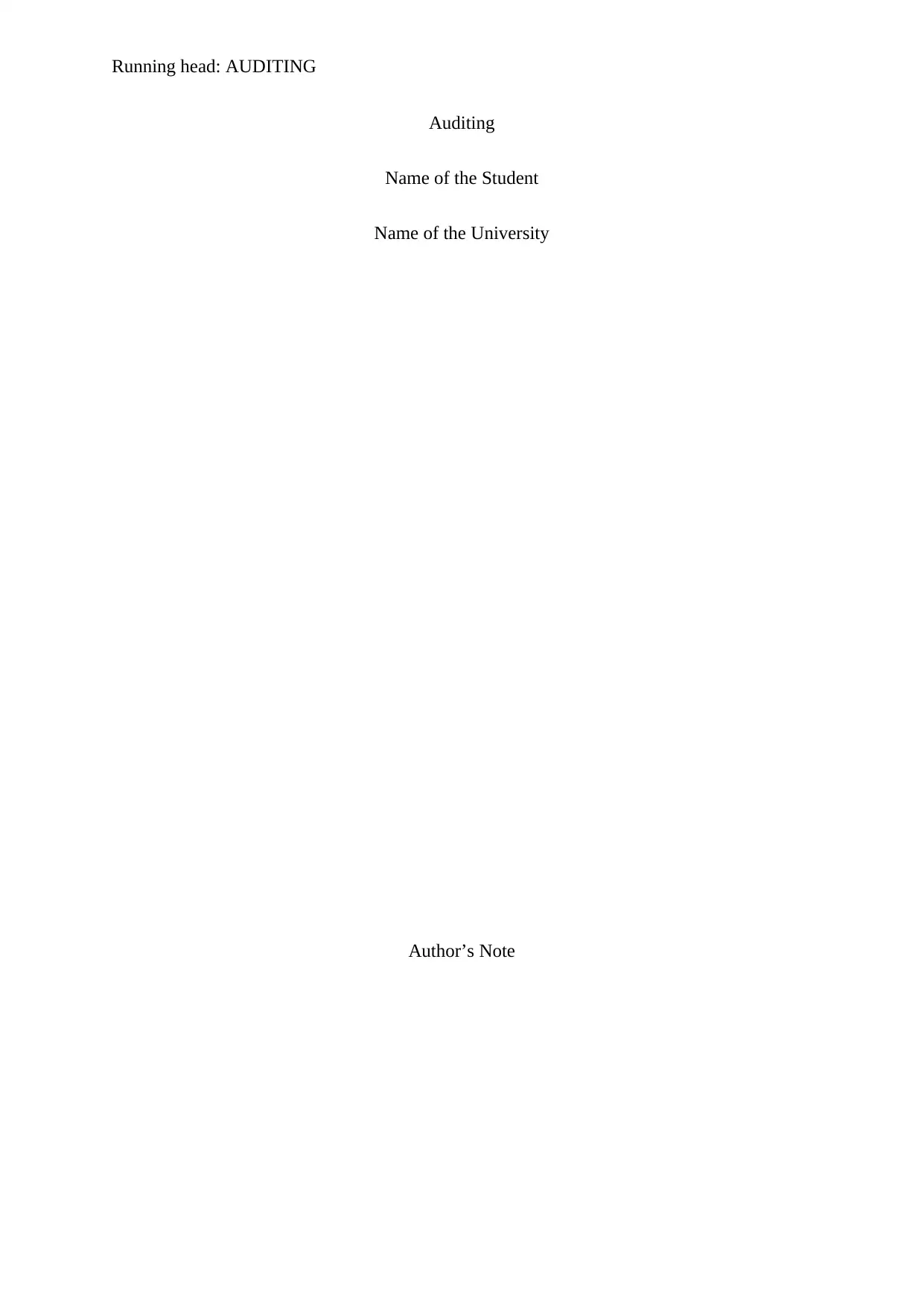
Running head: AUDITING
Auditing
Name of the Student
Name of the University
Author’s Note
Auditing
Name of the Student
Name of the University
Author’s Note
Paraphrase This Document
Need a fresh take? Get an instant paraphrase of this document with our AI Paraphraser
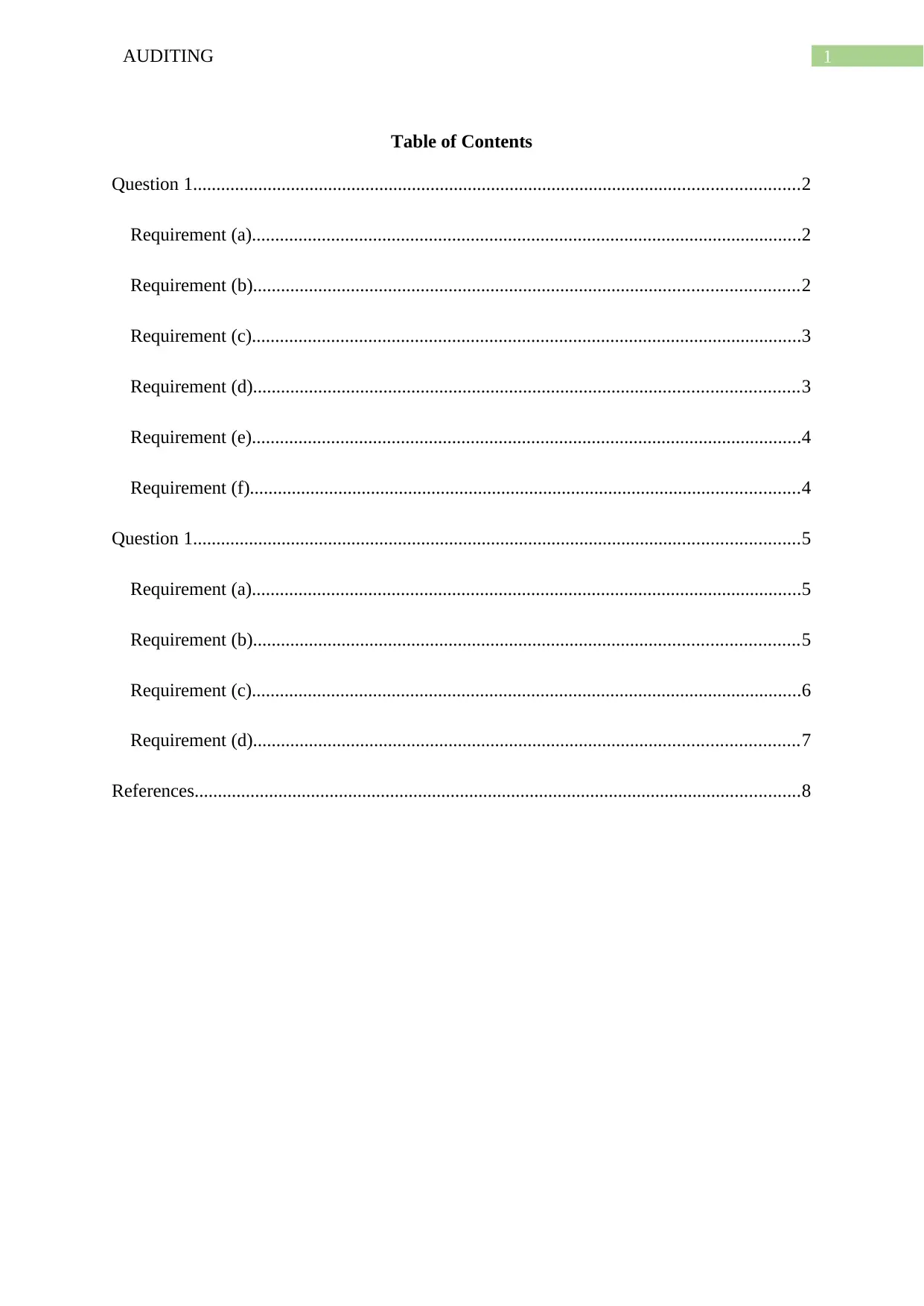
1AUDITING
Table of Contents
Question 1..................................................................................................................................2
Requirement (a)......................................................................................................................2
Requirement (b).....................................................................................................................2
Requirement (c)......................................................................................................................3
Requirement (d).....................................................................................................................3
Requirement (e)......................................................................................................................4
Requirement (f)......................................................................................................................4
Question 1..................................................................................................................................5
Requirement (a)......................................................................................................................5
Requirement (b).....................................................................................................................5
Requirement (c)......................................................................................................................6
Requirement (d).....................................................................................................................7
References..................................................................................................................................8
Table of Contents
Question 1..................................................................................................................................2
Requirement (a)......................................................................................................................2
Requirement (b).....................................................................................................................2
Requirement (c)......................................................................................................................3
Requirement (d).....................................................................................................................3
Requirement (e)......................................................................................................................4
Requirement (f)......................................................................................................................4
Question 1..................................................................................................................................5
Requirement (a)......................................................................................................................5
Requirement (b).....................................................................................................................5
Requirement (c)......................................................................................................................6
Requirement (d).....................................................................................................................7
References..................................................................................................................................8
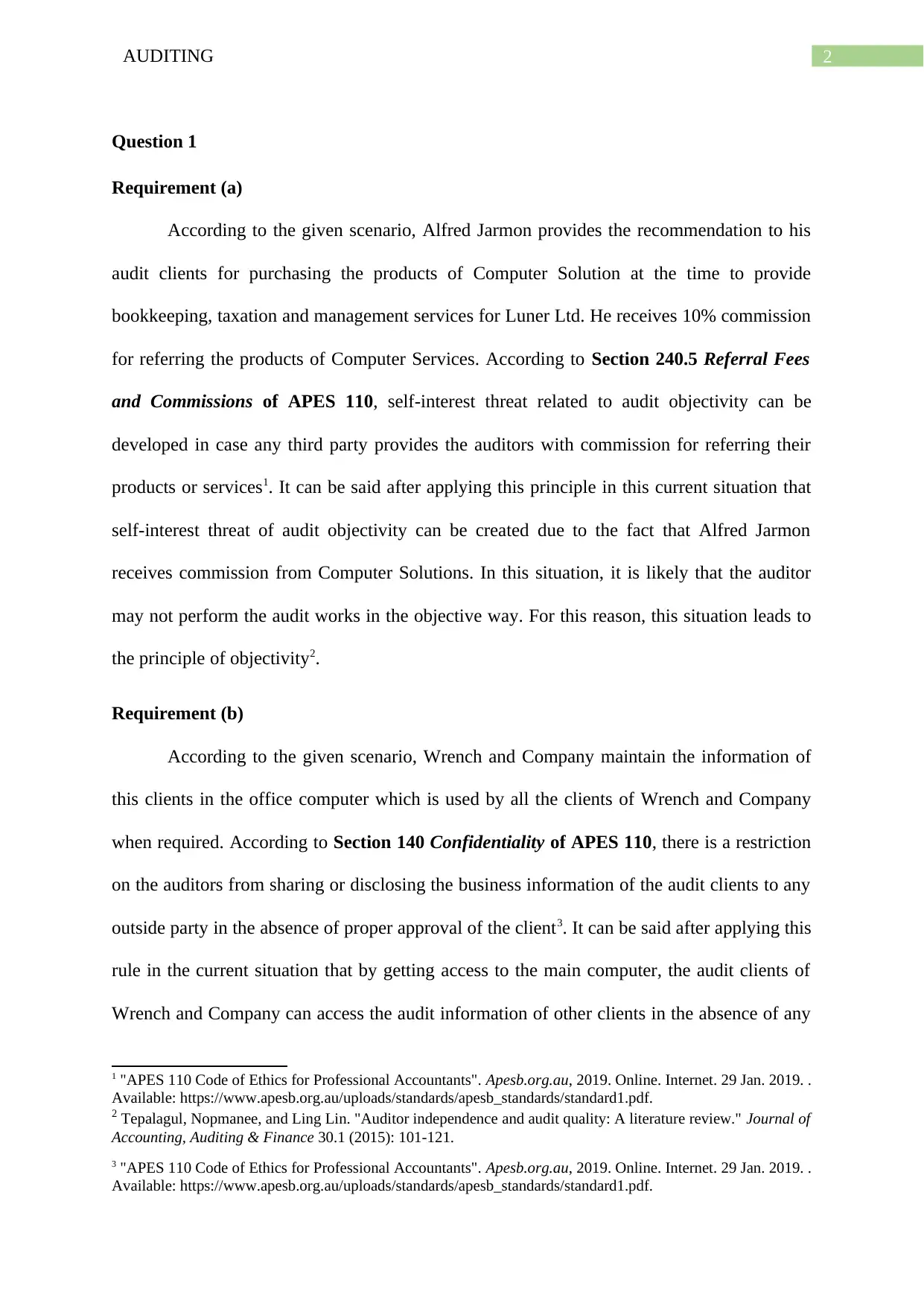
2AUDITING
Question 1
Requirement (a)
According to the given scenario, Alfred Jarmon provides the recommendation to his
audit clients for purchasing the products of Computer Solution at the time to provide
bookkeeping, taxation and management services for Luner Ltd. He receives 10% commission
for referring the products of Computer Services. According to Section 240.5 Referral Fees
and Commissions of APES 110, self-interest threat related to audit objectivity can be
developed in case any third party provides the auditors with commission for referring their
products or services1. It can be said after applying this principle in this current situation that
self-interest threat of audit objectivity can be created due to the fact that Alfred Jarmon
receives commission from Computer Solutions. In this situation, it is likely that the auditor
may not perform the audit works in the objective way. For this reason, this situation leads to
the principle of objectivity2.
Requirement (b)
According to the given scenario, Wrench and Company maintain the information of
this clients in the office computer which is used by all the clients of Wrench and Company
when required. According to Section 140 Confidentiality of APES 110, there is a restriction
on the auditors from sharing or disclosing the business information of the audit clients to any
outside party in the absence of proper approval of the client3. It can be said after applying this
rule in the current situation that by getting access to the main computer, the audit clients of
Wrench and Company can access the audit information of other clients in the absence of any
1 "APES 110 Code of Ethics for Professional Accountants". Apesb.org.au, 2019. Online. Internet. 29 Jan. 2019. .
Available: https://www.apesb.org.au/uploads/standards/apesb_standards/standard1.pdf.
2 Tepalagul, Nopmanee, and Ling Lin. "Auditor independence and audit quality: A literature review." Journal of
Accounting, Auditing & Finance 30.1 (2015): 101-121.
3 "APES 110 Code of Ethics for Professional Accountants". Apesb.org.au, 2019. Online. Internet. 29 Jan. 2019. .
Available: https://www.apesb.org.au/uploads/standards/apesb_standards/standard1.pdf.
Question 1
Requirement (a)
According to the given scenario, Alfred Jarmon provides the recommendation to his
audit clients for purchasing the products of Computer Solution at the time to provide
bookkeeping, taxation and management services for Luner Ltd. He receives 10% commission
for referring the products of Computer Services. According to Section 240.5 Referral Fees
and Commissions of APES 110, self-interest threat related to audit objectivity can be
developed in case any third party provides the auditors with commission for referring their
products or services1. It can be said after applying this principle in this current situation that
self-interest threat of audit objectivity can be created due to the fact that Alfred Jarmon
receives commission from Computer Solutions. In this situation, it is likely that the auditor
may not perform the audit works in the objective way. For this reason, this situation leads to
the principle of objectivity2.
Requirement (b)
According to the given scenario, Wrench and Company maintain the information of
this clients in the office computer which is used by all the clients of Wrench and Company
when required. According to Section 140 Confidentiality of APES 110, there is a restriction
on the auditors from sharing or disclosing the business information of the audit clients to any
outside party in the absence of proper approval of the client3. It can be said after applying this
rule in the current situation that by getting access to the main computer, the audit clients of
Wrench and Company can access the audit information of other clients in the absence of any
1 "APES 110 Code of Ethics for Professional Accountants". Apesb.org.au, 2019. Online. Internet. 29 Jan. 2019. .
Available: https://www.apesb.org.au/uploads/standards/apesb_standards/standard1.pdf.
2 Tepalagul, Nopmanee, and Ling Lin. "Auditor independence and audit quality: A literature review." Journal of
Accounting, Auditing & Finance 30.1 (2015): 101-121.
3 "APES 110 Code of Ethics for Professional Accountants". Apesb.org.au, 2019. Online. Internet. 29 Jan. 2019. .
Available: https://www.apesb.org.au/uploads/standards/apesb_standards/standard1.pdf.
⊘ This is a preview!⊘
Do you want full access?
Subscribe today to unlock all pages.

Trusted by 1+ million students worldwide
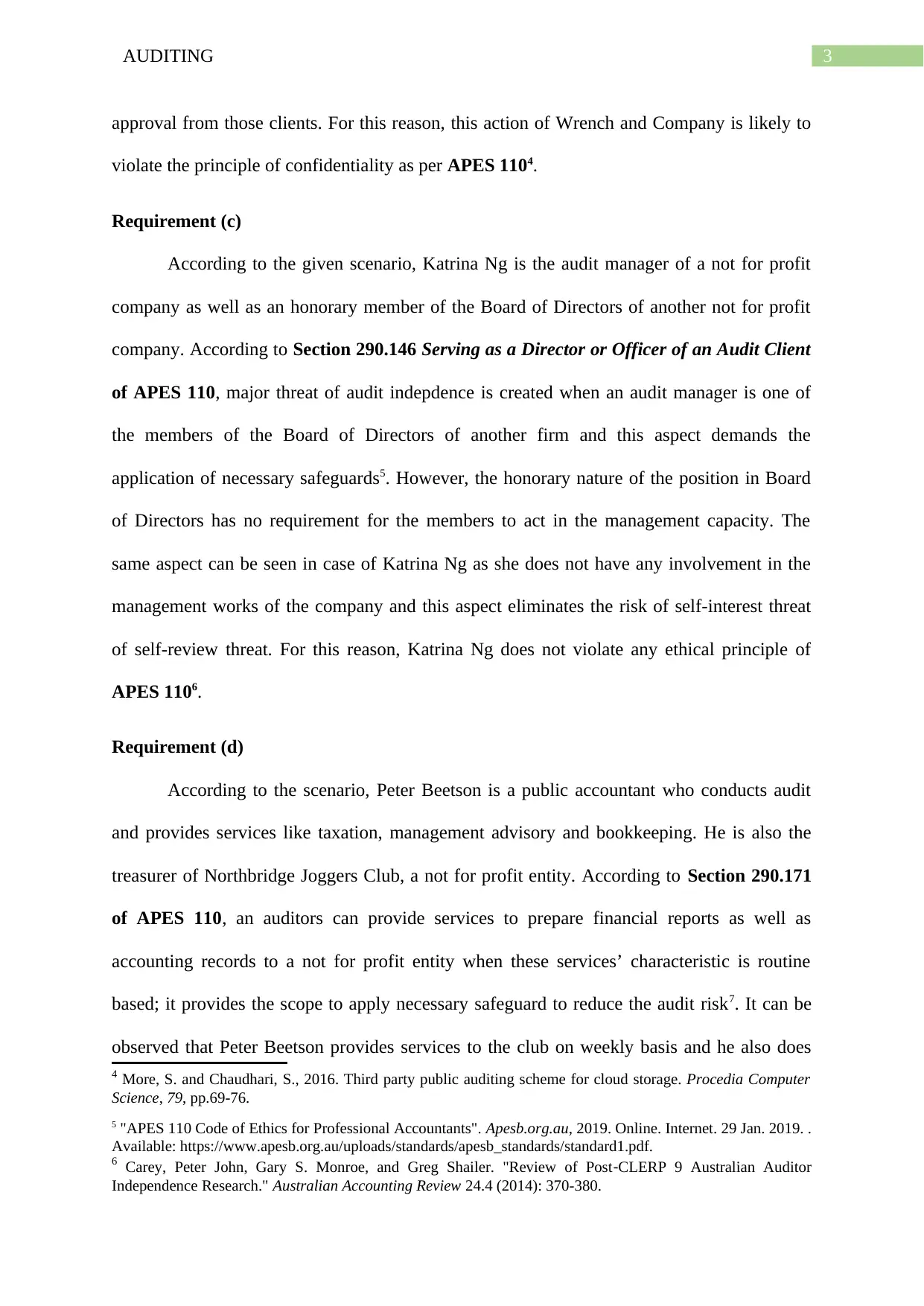
3AUDITING
approval from those clients. For this reason, this action of Wrench and Company is likely to
violate the principle of confidentiality as per APES 1104.
Requirement (c)
According to the given scenario, Katrina Ng is the audit manager of a not for profit
company as well as an honorary member of the Board of Directors of another not for profit
company. According to Section 290.146 Serving as a Director or Officer of an Audit Client
of APES 110, major threat of audit indepdence is created when an audit manager is one of
the members of the Board of Directors of another firm and this aspect demands the
application of necessary safeguards5. However, the honorary nature of the position in Board
of Directors has no requirement for the members to act in the management capacity. The
same aspect can be seen in case of Katrina Ng as she does not have any involvement in the
management works of the company and this aspect eliminates the risk of self-interest threat
of self-review threat. For this reason, Katrina Ng does not violate any ethical principle of
APES 1106.
Requirement (d)
According to the scenario, Peter Beetson is a public accountant who conducts audit
and provides services like taxation, management advisory and bookkeeping. He is also the
treasurer of Northbridge Joggers Club, a not for profit entity. According to Section 290.171
of APES 110, an auditors can provide services to prepare financial reports as well as
accounting records to a not for profit entity when these services’ characteristic is routine
based; it provides the scope to apply necessary safeguard to reduce the audit risk7. It can be
observed that Peter Beetson provides services to the club on weekly basis and he also does
4 More, S. and Chaudhari, S., 2016. Third party public auditing scheme for cloud storage. Procedia Computer
Science, 79, pp.69-76.
5 "APES 110 Code of Ethics for Professional Accountants". Apesb.org.au, 2019. Online. Internet. 29 Jan. 2019. .
Available: https://www.apesb.org.au/uploads/standards/apesb_standards/standard1.pdf.
6 Carey, Peter John, Gary S. Monroe, and Greg Shailer. "Review of Post‐CLERP 9 Australian Auditor
Independence Research." Australian Accounting Review 24.4 (2014): 370-380.
approval from those clients. For this reason, this action of Wrench and Company is likely to
violate the principle of confidentiality as per APES 1104.
Requirement (c)
According to the given scenario, Katrina Ng is the audit manager of a not for profit
company as well as an honorary member of the Board of Directors of another not for profit
company. According to Section 290.146 Serving as a Director or Officer of an Audit Client
of APES 110, major threat of audit indepdence is created when an audit manager is one of
the members of the Board of Directors of another firm and this aspect demands the
application of necessary safeguards5. However, the honorary nature of the position in Board
of Directors has no requirement for the members to act in the management capacity. The
same aspect can be seen in case of Katrina Ng as she does not have any involvement in the
management works of the company and this aspect eliminates the risk of self-interest threat
of self-review threat. For this reason, Katrina Ng does not violate any ethical principle of
APES 1106.
Requirement (d)
According to the scenario, Peter Beetson is a public accountant who conducts audit
and provides services like taxation, management advisory and bookkeeping. He is also the
treasurer of Northbridge Joggers Club, a not for profit entity. According to Section 290.171
of APES 110, an auditors can provide services to prepare financial reports as well as
accounting records to a not for profit entity when these services’ characteristic is routine
based; it provides the scope to apply necessary safeguard to reduce the audit risk7. It can be
observed that Peter Beetson provides services to the club on weekly basis and he also does
4 More, S. and Chaudhari, S., 2016. Third party public auditing scheme for cloud storage. Procedia Computer
Science, 79, pp.69-76.
5 "APES 110 Code of Ethics for Professional Accountants". Apesb.org.au, 2019. Online. Internet. 29 Jan. 2019. .
Available: https://www.apesb.org.au/uploads/standards/apesb_standards/standard1.pdf.
6 Carey, Peter John, Gary S. Monroe, and Greg Shailer. "Review of Post‐CLERP 9 Australian Auditor
Independence Research." Australian Accounting Review 24.4 (2014): 370-380.
Paraphrase This Document
Need a fresh take? Get an instant paraphrase of this document with our AI Paraphraser
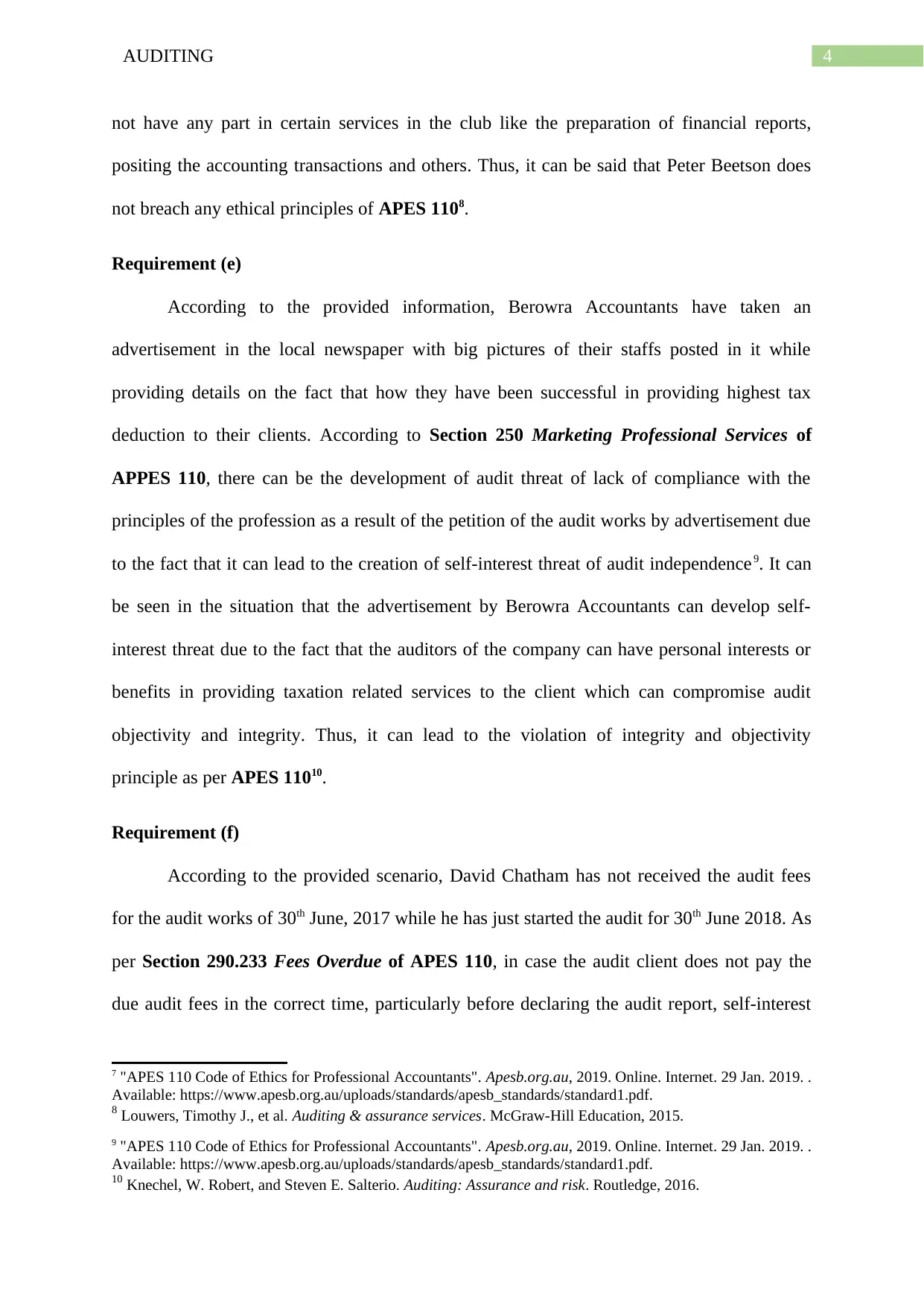
4AUDITING
not have any part in certain services in the club like the preparation of financial reports,
positing the accounting transactions and others. Thus, it can be said that Peter Beetson does
not breach any ethical principles of APES 1108.
Requirement (e)
According to the provided information, Berowra Accountants have taken an
advertisement in the local newspaper with big pictures of their staffs posted in it while
providing details on the fact that how they have been successful in providing highest tax
deduction to their clients. According to Section 250 Marketing Professional Services of
APPES 110, there can be the development of audit threat of lack of compliance with the
principles of the profession as a result of the petition of the audit works by advertisement due
to the fact that it can lead to the creation of self-interest threat of audit independence9. It can
be seen in the situation that the advertisement by Berowra Accountants can develop self-
interest threat due to the fact that the auditors of the company can have personal interests or
benefits in providing taxation related services to the client which can compromise audit
objectivity and integrity. Thus, it can lead to the violation of integrity and objectivity
principle as per APES 11010.
Requirement (f)
According to the provided scenario, David Chatham has not received the audit fees
for the audit works of 30th June, 2017 while he has just started the audit for 30th June 2018. As
per Section 290.233 Fees Overdue of APES 110, in case the audit client does not pay the
due audit fees in the correct time, particularly before declaring the audit report, self-interest
7 "APES 110 Code of Ethics for Professional Accountants". Apesb.org.au, 2019. Online. Internet. 29 Jan. 2019. .
Available: https://www.apesb.org.au/uploads/standards/apesb_standards/standard1.pdf.
8 Louwers, Timothy J., et al. Auditing & assurance services. McGraw-Hill Education, 2015.
9 "APES 110 Code of Ethics for Professional Accountants". Apesb.org.au, 2019. Online. Internet. 29 Jan. 2019. .
Available: https://www.apesb.org.au/uploads/standards/apesb_standards/standard1.pdf.
10 Knechel, W. Robert, and Steven E. Salterio. Auditing: Assurance and risk. Routledge, 2016.
not have any part in certain services in the club like the preparation of financial reports,
positing the accounting transactions and others. Thus, it can be said that Peter Beetson does
not breach any ethical principles of APES 1108.
Requirement (e)
According to the provided information, Berowra Accountants have taken an
advertisement in the local newspaper with big pictures of their staffs posted in it while
providing details on the fact that how they have been successful in providing highest tax
deduction to their clients. According to Section 250 Marketing Professional Services of
APPES 110, there can be the development of audit threat of lack of compliance with the
principles of the profession as a result of the petition of the audit works by advertisement due
to the fact that it can lead to the creation of self-interest threat of audit independence9. It can
be seen in the situation that the advertisement by Berowra Accountants can develop self-
interest threat due to the fact that the auditors of the company can have personal interests or
benefits in providing taxation related services to the client which can compromise audit
objectivity and integrity. Thus, it can lead to the violation of integrity and objectivity
principle as per APES 11010.
Requirement (f)
According to the provided scenario, David Chatham has not received the audit fees
for the audit works of 30th June, 2017 while he has just started the audit for 30th June 2018. As
per Section 290.233 Fees Overdue of APES 110, in case the audit client does not pay the
due audit fees in the correct time, particularly before declaring the audit report, self-interest
7 "APES 110 Code of Ethics for Professional Accountants". Apesb.org.au, 2019. Online. Internet. 29 Jan. 2019. .
Available: https://www.apesb.org.au/uploads/standards/apesb_standards/standard1.pdf.
8 Louwers, Timothy J., et al. Auditing & assurance services. McGraw-Hill Education, 2015.
9 "APES 110 Code of Ethics for Professional Accountants". Apesb.org.au, 2019. Online. Internet. 29 Jan. 2019. .
Available: https://www.apesb.org.au/uploads/standards/apesb_standards/standard1.pdf.
10 Knechel, W. Robert, and Steven E. Salterio. Auditing: Assurance and risk. Routledge, 2016.
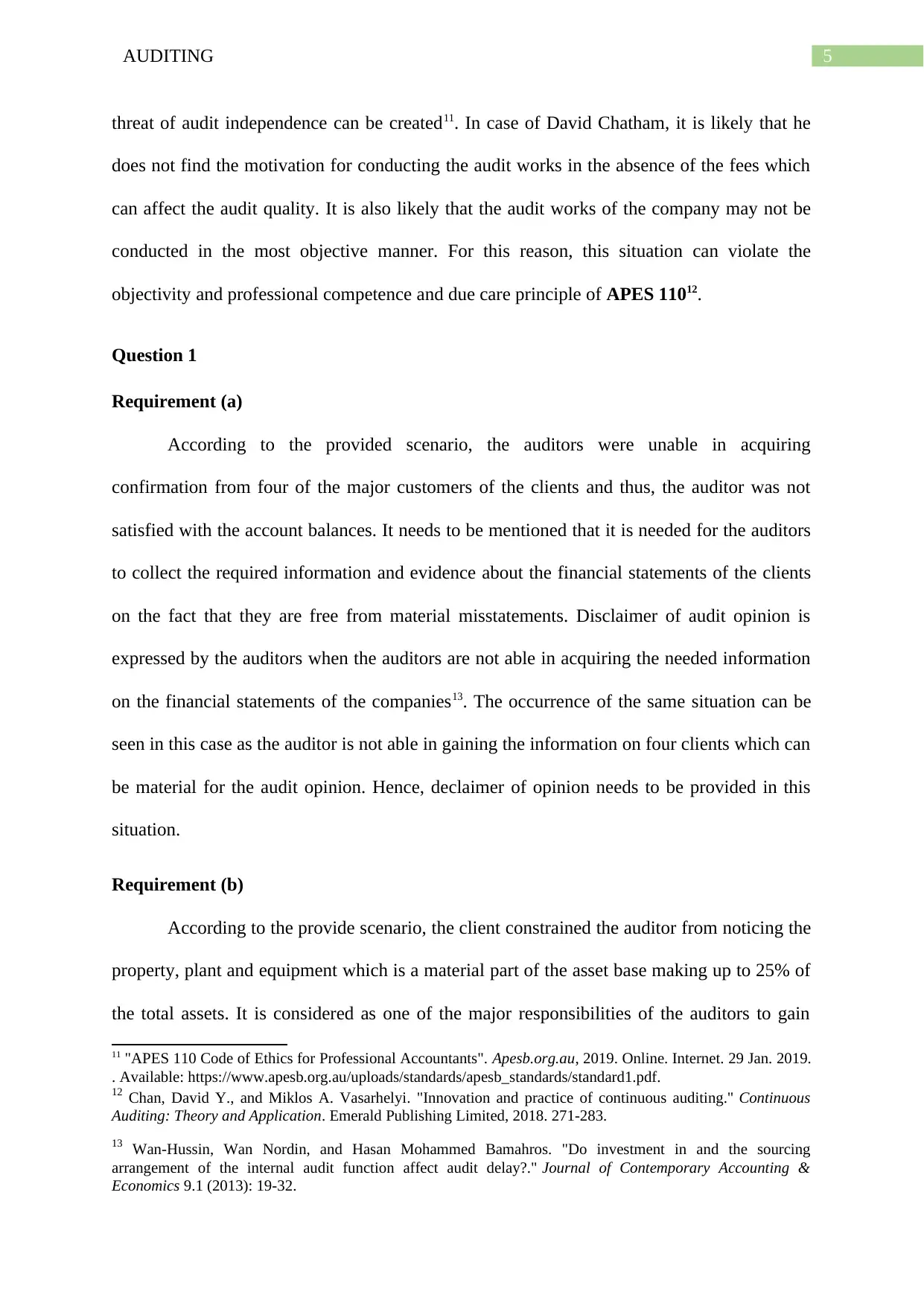
5AUDITING
threat of audit independence can be created11. In case of David Chatham, it is likely that he
does not find the motivation for conducting the audit works in the absence of the fees which
can affect the audit quality. It is also likely that the audit works of the company may not be
conducted in the most objective manner. For this reason, this situation can violate the
objectivity and professional competence and due care principle of APES 11012.
Question 1
Requirement (a)
According to the provided scenario, the auditors were unable in acquiring
confirmation from four of the major customers of the clients and thus, the auditor was not
satisfied with the account balances. It needs to be mentioned that it is needed for the auditors
to collect the required information and evidence about the financial statements of the clients
on the fact that they are free from material misstatements. Disclaimer of audit opinion is
expressed by the auditors when the auditors are not able in acquiring the needed information
on the financial statements of the companies13. The occurrence of the same situation can be
seen in this case as the auditor is not able in gaining the information on four clients which can
be material for the audit opinion. Hence, declaimer of opinion needs to be provided in this
situation.
Requirement (b)
According to the provide scenario, the client constrained the auditor from noticing the
property, plant and equipment which is a material part of the asset base making up to 25% of
the total assets. It is considered as one of the major responsibilities of the auditors to gain
11 "APES 110 Code of Ethics for Professional Accountants". Apesb.org.au, 2019. Online. Internet. 29 Jan. 2019.
. Available: https://www.apesb.org.au/uploads/standards/apesb_standards/standard1.pdf.
12 Chan, David Y., and Miklos A. Vasarhelyi. "Innovation and practice of continuous auditing." Continuous
Auditing: Theory and Application. Emerald Publishing Limited, 2018. 271-283.
13 Wan-Hussin, Wan Nordin, and Hasan Mohammed Bamahros. "Do investment in and the sourcing
arrangement of the internal audit function affect audit delay?." Journal of Contemporary Accounting &
Economics 9.1 (2013): 19-32.
threat of audit independence can be created11. In case of David Chatham, it is likely that he
does not find the motivation for conducting the audit works in the absence of the fees which
can affect the audit quality. It is also likely that the audit works of the company may not be
conducted in the most objective manner. For this reason, this situation can violate the
objectivity and professional competence and due care principle of APES 11012.
Question 1
Requirement (a)
According to the provided scenario, the auditors were unable in acquiring
confirmation from four of the major customers of the clients and thus, the auditor was not
satisfied with the account balances. It needs to be mentioned that it is needed for the auditors
to collect the required information and evidence about the financial statements of the clients
on the fact that they are free from material misstatements. Disclaimer of audit opinion is
expressed by the auditors when the auditors are not able in acquiring the needed information
on the financial statements of the companies13. The occurrence of the same situation can be
seen in this case as the auditor is not able in gaining the information on four clients which can
be material for the audit opinion. Hence, declaimer of opinion needs to be provided in this
situation.
Requirement (b)
According to the provide scenario, the client constrained the auditor from noticing the
property, plant and equipment which is a material part of the asset base making up to 25% of
the total assets. It is considered as one of the major responsibilities of the auditors to gain
11 "APES 110 Code of Ethics for Professional Accountants". Apesb.org.au, 2019. Online. Internet. 29 Jan. 2019.
. Available: https://www.apesb.org.au/uploads/standards/apesb_standards/standard1.pdf.
12 Chan, David Y., and Miklos A. Vasarhelyi. "Innovation and practice of continuous auditing." Continuous
Auditing: Theory and Application. Emerald Publishing Limited, 2018. 271-283.
13 Wan-Hussin, Wan Nordin, and Hasan Mohammed Bamahros. "Do investment in and the sourcing
arrangement of the internal audit function affect audit delay?." Journal of Contemporary Accounting &
Economics 9.1 (2013): 19-32.
⊘ This is a preview!⊘
Do you want full access?
Subscribe today to unlock all pages.

Trusted by 1+ million students worldwide
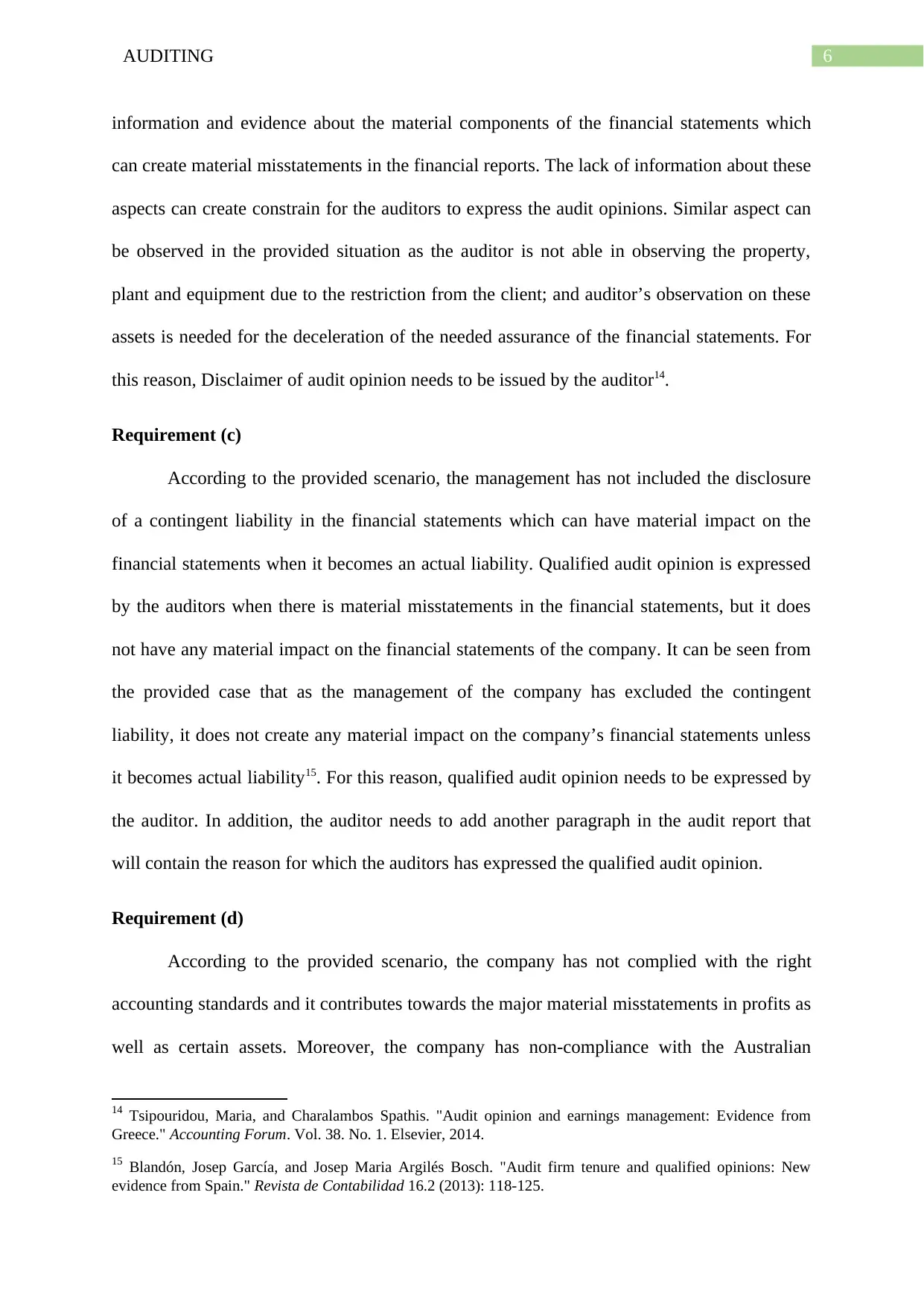
6AUDITING
information and evidence about the material components of the financial statements which
can create material misstatements in the financial reports. The lack of information about these
aspects can create constrain for the auditors to express the audit opinions. Similar aspect can
be observed in the provided situation as the auditor is not able in observing the property,
plant and equipment due to the restriction from the client; and auditor’s observation on these
assets is needed for the deceleration of the needed assurance of the financial statements. For
this reason, Disclaimer of audit opinion needs to be issued by the auditor14.
Requirement (c)
According to the provided scenario, the management has not included the disclosure
of a contingent liability in the financial statements which can have material impact on the
financial statements when it becomes an actual liability. Qualified audit opinion is expressed
by the auditors when there is material misstatements in the financial statements, but it does
not have any material impact on the financial statements of the company. It can be seen from
the provided case that as the management of the company has excluded the contingent
liability, it does not create any material impact on the company’s financial statements unless
it becomes actual liability15. For this reason, qualified audit opinion needs to be expressed by
the auditor. In addition, the auditor needs to add another paragraph in the audit report that
will contain the reason for which the auditors has expressed the qualified audit opinion.
Requirement (d)
According to the provided scenario, the company has not complied with the right
accounting standards and it contributes towards the major material misstatements in profits as
well as certain assets. Moreover, the company has non-compliance with the Australian
14 Tsipouridou, Maria, and Charalambos Spathis. "Audit opinion and earnings management: Evidence from
Greece." Accounting Forum. Vol. 38. No. 1. Elsevier, 2014.
15 Blandón, Josep García, and Josep Maria Argilés Bosch. "Audit firm tenure and qualified opinions: New
evidence from Spain." Revista de Contabilidad 16.2 (2013): 118-125.
information and evidence about the material components of the financial statements which
can create material misstatements in the financial reports. The lack of information about these
aspects can create constrain for the auditors to express the audit opinions. Similar aspect can
be observed in the provided situation as the auditor is not able in observing the property,
plant and equipment due to the restriction from the client; and auditor’s observation on these
assets is needed for the deceleration of the needed assurance of the financial statements. For
this reason, Disclaimer of audit opinion needs to be issued by the auditor14.
Requirement (c)
According to the provided scenario, the management has not included the disclosure
of a contingent liability in the financial statements which can have material impact on the
financial statements when it becomes an actual liability. Qualified audit opinion is expressed
by the auditors when there is material misstatements in the financial statements, but it does
not have any material impact on the financial statements of the company. It can be seen from
the provided case that as the management of the company has excluded the contingent
liability, it does not create any material impact on the company’s financial statements unless
it becomes actual liability15. For this reason, qualified audit opinion needs to be expressed by
the auditor. In addition, the auditor needs to add another paragraph in the audit report that
will contain the reason for which the auditors has expressed the qualified audit opinion.
Requirement (d)
According to the provided scenario, the company has not complied with the right
accounting standards and it contributes towards the major material misstatements in profits as
well as certain assets. Moreover, the company has non-compliance with the Australian
14 Tsipouridou, Maria, and Charalambos Spathis. "Audit opinion and earnings management: Evidence from
Greece." Accounting Forum. Vol. 38. No. 1. Elsevier, 2014.
15 Blandón, Josep García, and Josep Maria Argilés Bosch. "Audit firm tenure and qualified opinions: New
evidence from Spain." Revista de Contabilidad 16.2 (2013): 118-125.
Paraphrase This Document
Need a fresh take? Get an instant paraphrase of this document with our AI Paraphraser
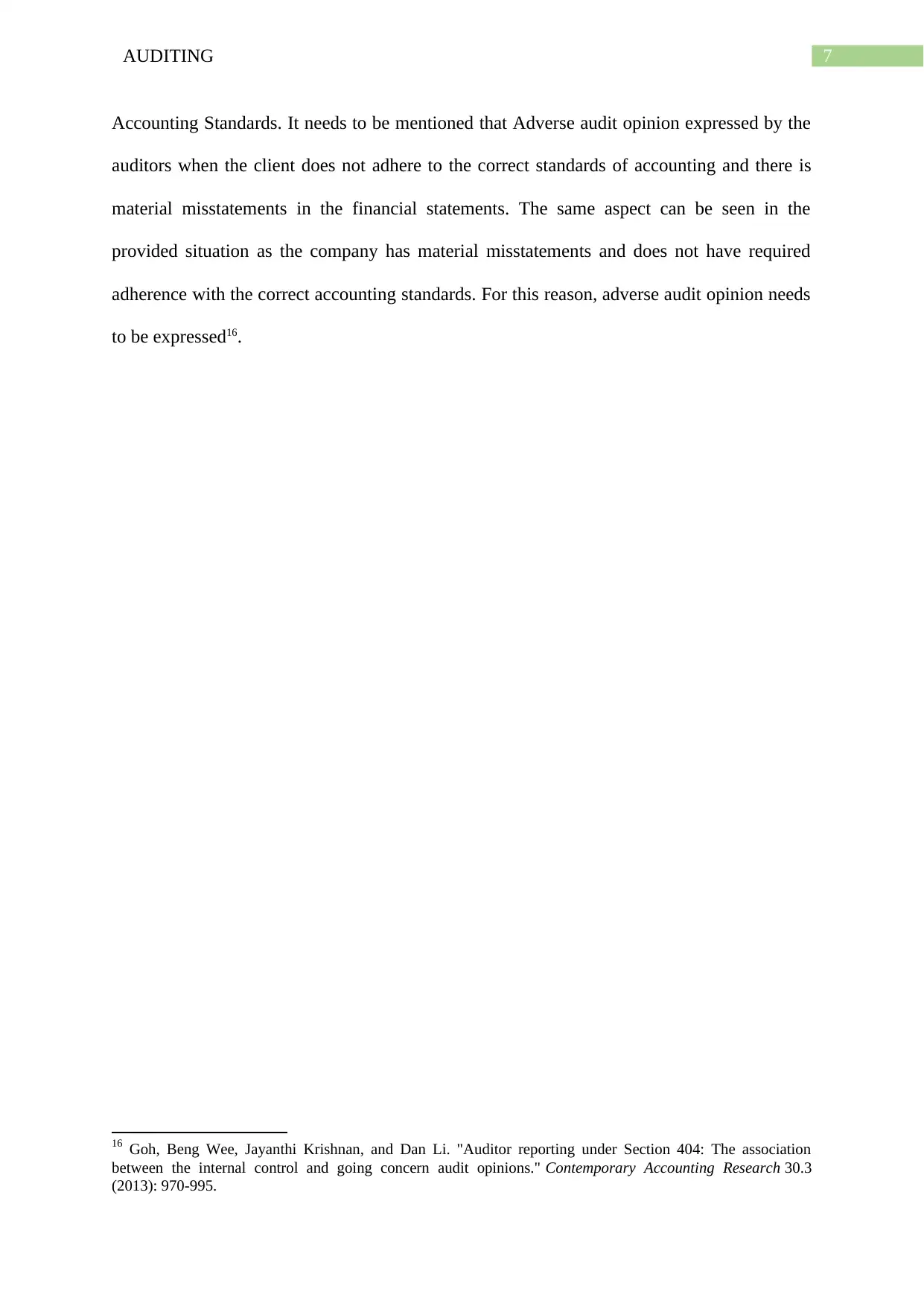
7AUDITING
Accounting Standards. It needs to be mentioned that Adverse audit opinion expressed by the
auditors when the client does not adhere to the correct standards of accounting and there is
material misstatements in the financial statements. The same aspect can be seen in the
provided situation as the company has material misstatements and does not have required
adherence with the correct accounting standards. For this reason, adverse audit opinion needs
to be expressed16.
16 Goh, Beng Wee, Jayanthi Krishnan, and Dan Li. "Auditor reporting under Section 404: The association
between the internal control and going concern audit opinions." Contemporary Accounting Research 30.3
(2013): 970-995.
Accounting Standards. It needs to be mentioned that Adverse audit opinion expressed by the
auditors when the client does not adhere to the correct standards of accounting and there is
material misstatements in the financial statements. The same aspect can be seen in the
provided situation as the company has material misstatements and does not have required
adherence with the correct accounting standards. For this reason, adverse audit opinion needs
to be expressed16.
16 Goh, Beng Wee, Jayanthi Krishnan, and Dan Li. "Auditor reporting under Section 404: The association
between the internal control and going concern audit opinions." Contemporary Accounting Research 30.3
(2013): 970-995.
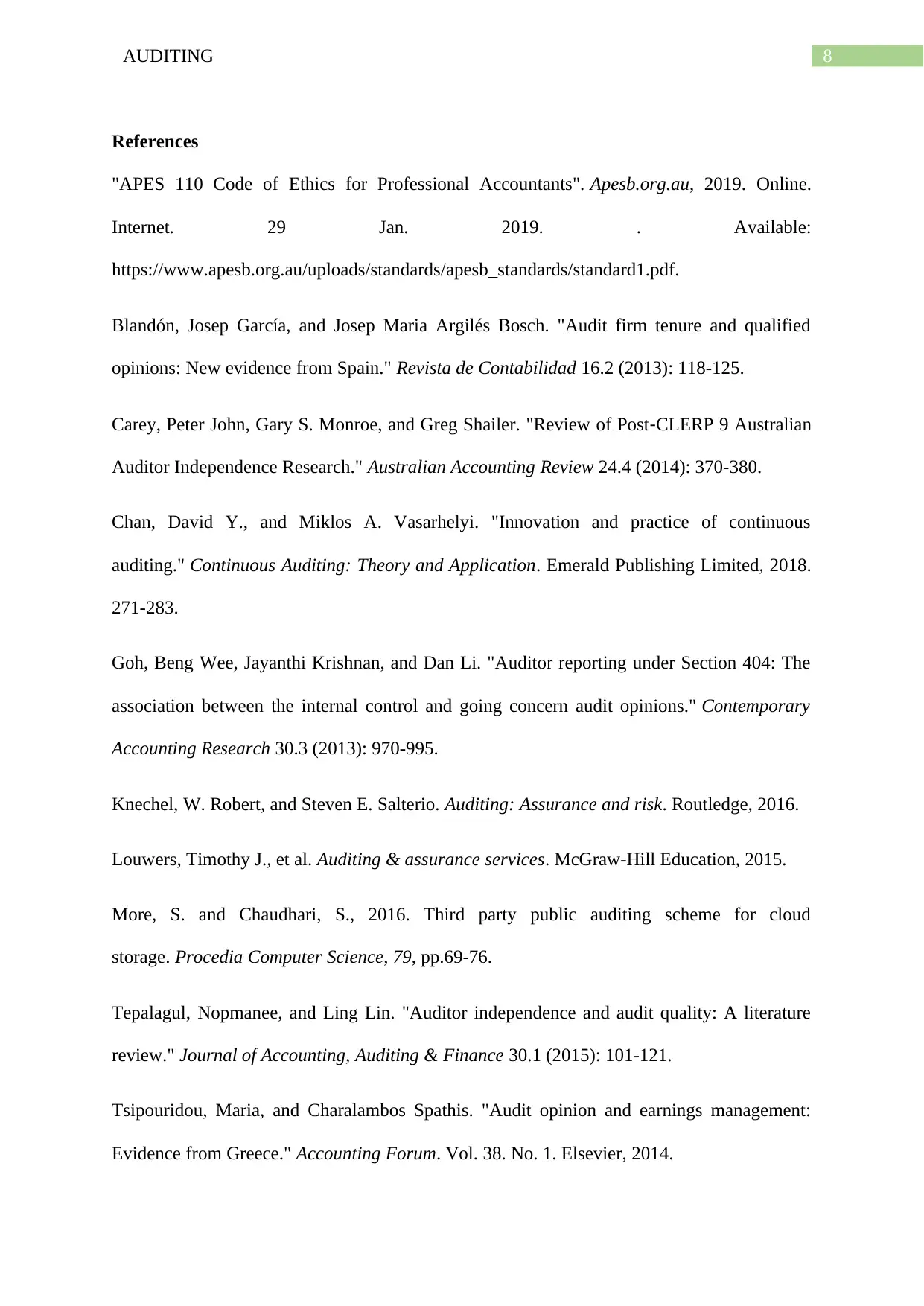
8AUDITING
References
"APES 110 Code of Ethics for Professional Accountants". Apesb.org.au, 2019. Online.
Internet. 29 Jan. 2019. . Available:
https://www.apesb.org.au/uploads/standards/apesb_standards/standard1.pdf.
Blandón, Josep García, and Josep Maria Argilés Bosch. "Audit firm tenure and qualified
opinions: New evidence from Spain." Revista de Contabilidad 16.2 (2013): 118-125.
Carey, Peter John, Gary S. Monroe, and Greg Shailer. "Review of Post‐CLERP 9 Australian
Auditor Independence Research." Australian Accounting Review 24.4 (2014): 370-380.
Chan, David Y., and Miklos A. Vasarhelyi. "Innovation and practice of continuous
auditing." Continuous Auditing: Theory and Application. Emerald Publishing Limited, 2018.
271-283.
Goh, Beng Wee, Jayanthi Krishnan, and Dan Li. "Auditor reporting under Section 404: The
association between the internal control and going concern audit opinions." Contemporary
Accounting Research 30.3 (2013): 970-995.
Knechel, W. Robert, and Steven E. Salterio. Auditing: Assurance and risk. Routledge, 2016.
Louwers, Timothy J., et al. Auditing & assurance services. McGraw-Hill Education, 2015.
More, S. and Chaudhari, S., 2016. Third party public auditing scheme for cloud
storage. Procedia Computer Science, 79, pp.69-76.
Tepalagul, Nopmanee, and Ling Lin. "Auditor independence and audit quality: A literature
review." Journal of Accounting, Auditing & Finance 30.1 (2015): 101-121.
Tsipouridou, Maria, and Charalambos Spathis. "Audit opinion and earnings management:
Evidence from Greece." Accounting Forum. Vol. 38. No. 1. Elsevier, 2014.
References
"APES 110 Code of Ethics for Professional Accountants". Apesb.org.au, 2019. Online.
Internet. 29 Jan. 2019. . Available:
https://www.apesb.org.au/uploads/standards/apesb_standards/standard1.pdf.
Blandón, Josep García, and Josep Maria Argilés Bosch. "Audit firm tenure and qualified
opinions: New evidence from Spain." Revista de Contabilidad 16.2 (2013): 118-125.
Carey, Peter John, Gary S. Monroe, and Greg Shailer. "Review of Post‐CLERP 9 Australian
Auditor Independence Research." Australian Accounting Review 24.4 (2014): 370-380.
Chan, David Y., and Miklos A. Vasarhelyi. "Innovation and practice of continuous
auditing." Continuous Auditing: Theory and Application. Emerald Publishing Limited, 2018.
271-283.
Goh, Beng Wee, Jayanthi Krishnan, and Dan Li. "Auditor reporting under Section 404: The
association between the internal control and going concern audit opinions." Contemporary
Accounting Research 30.3 (2013): 970-995.
Knechel, W. Robert, and Steven E. Salterio. Auditing: Assurance and risk. Routledge, 2016.
Louwers, Timothy J., et al. Auditing & assurance services. McGraw-Hill Education, 2015.
More, S. and Chaudhari, S., 2016. Third party public auditing scheme for cloud
storage. Procedia Computer Science, 79, pp.69-76.
Tepalagul, Nopmanee, and Ling Lin. "Auditor independence and audit quality: A literature
review." Journal of Accounting, Auditing & Finance 30.1 (2015): 101-121.
Tsipouridou, Maria, and Charalambos Spathis. "Audit opinion and earnings management:
Evidence from Greece." Accounting Forum. Vol. 38. No. 1. Elsevier, 2014.
⊘ This is a preview!⊘
Do you want full access?
Subscribe today to unlock all pages.

Trusted by 1+ million students worldwide
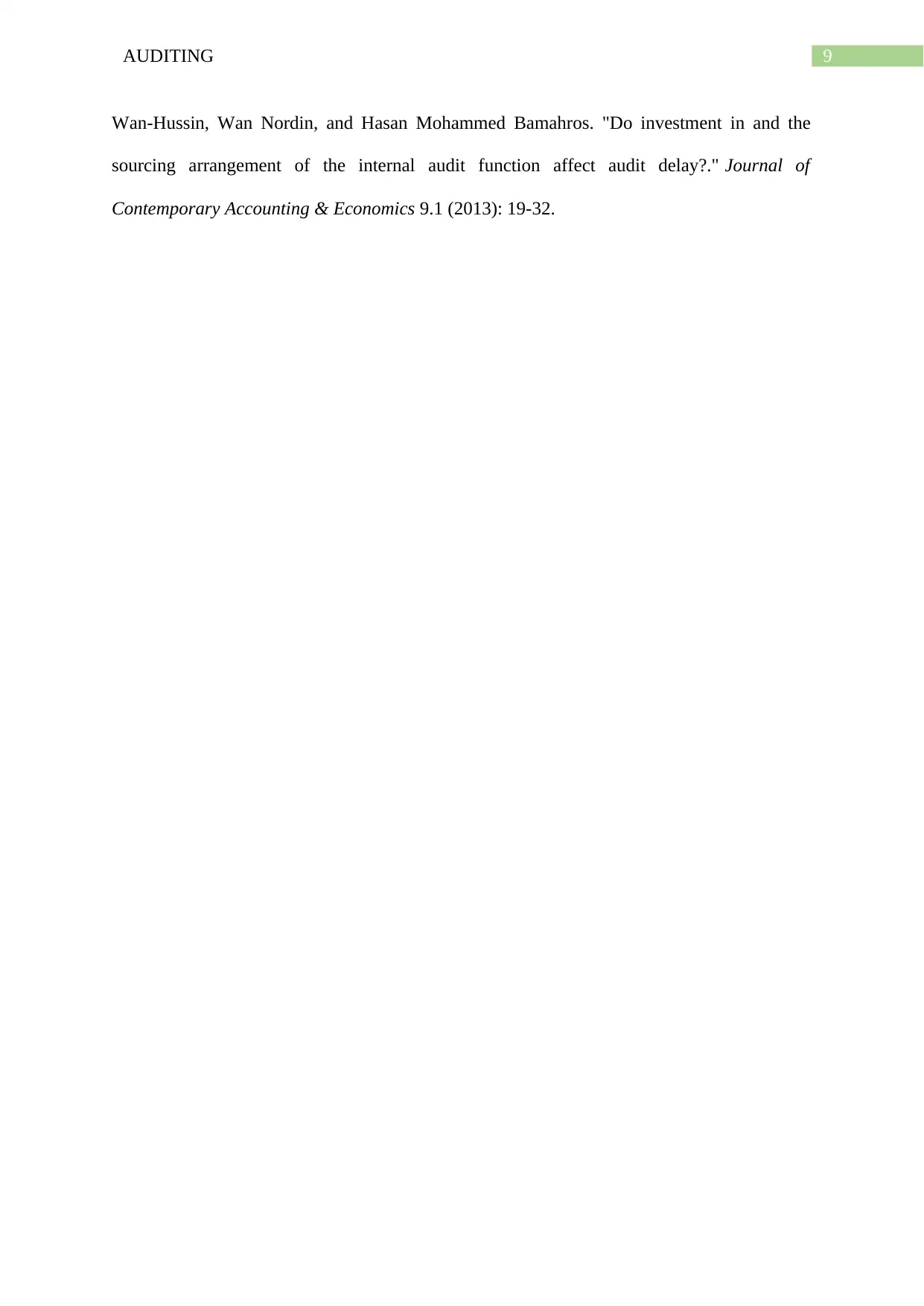
9AUDITING
Wan-Hussin, Wan Nordin, and Hasan Mohammed Bamahros. "Do investment in and the
sourcing arrangement of the internal audit function affect audit delay?." Journal of
Contemporary Accounting & Economics 9.1 (2013): 19-32.
Wan-Hussin, Wan Nordin, and Hasan Mohammed Bamahros. "Do investment in and the
sourcing arrangement of the internal audit function affect audit delay?." Journal of
Contemporary Accounting & Economics 9.1 (2013): 19-32.
1 out of 10
Related Documents
Your All-in-One AI-Powered Toolkit for Academic Success.
+13062052269
info@desklib.com
Available 24*7 on WhatsApp / Email
![[object Object]](/_next/static/media/star-bottom.7253800d.svg)
Unlock your academic potential
Copyright © 2020–2026 A2Z Services. All Rights Reserved. Developed and managed by ZUCOL.





